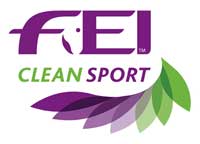
FEI delays implementation of Progressive List
The FEI has announced today (1 December) that the FEI Bureau has passed a Resolution delaying implementation of the new Equine Prohibited Substances List and the accompanying Equine Anti-Doping and Controlled Medication Regulations until 5 April 2010. This Resolution has been passed in order to allow for broader debate and consultation on the policy change approved at the recent FEI General Assembly regarding the restricted use of a small number of non-steroidal anti-inflammatory drugs (NSAIDs).
The FEI recognizes that a number of issues arise as a result of this policy change, which was voted in by a majority of 53-48 at the meeting in Copenhagen on 19 November. The change in policy will affect National Federations and organizers who must comply with state laws as well as international competition rules. It has implications for the breeding industry and the selection of horses and may impact on all those concerned with animal welfare. It also affects the laboratories involved in the testing procedures. The decision, which reversed the 1993 ban on phenylbutazone, has provoked considerable debate among FEI stakeholders.
The FEI acknowledges that these concerns are all legitimate and feels that there is clearly a need for further debate on the issue. The delayed implementation of the new Equine Prohibited Substances List will also allow for supplementary research to be carried out on the use of NSAIDs in the competition horse.
“The FEI has been criticized for not providing sufficient time for consultation on the substances that differentiate the new policy from the old and there has also been widespread unease about the late publication of the progressive list”, FEI President HRH Princess Haya said today. “Views that have been expressed since the vote are being taken extremely seriously by the FEI as legitimate welfare concerns and we give similar importance to our membership’s decision to effect a policy change. In light of both these considerations, we felt it was only fair to delay implementation of the new list to allow everyone to have their say and let other veterinary experts look at the science behind this policy change.
“The controversy surrounding the List has almost completely overshadowed the clean sport campaign, which received overwhelming support at the General Assembly. Now we can allow the focus to return to the wonderful work that has been undertaken by the Joint-Commissions chaired by Professor Arne Ljungqvist and Lord Stevens, which has provided a clear roadmap for the delivery of clean sport.”
NOTES FOR EDITORS:
Under Article 20.4 of the FEI Statutes, the FEI Bureau may, by a two-thirds majority, pass Resolutions which are normally passed by the General Assembly. In such cases, the National Federations can ultimately override the Bureau’s decision so long as a majority of NFs indicate their opposition within 30 days of the Resolution.
To date no specific requests regarding this issue have been directed to the FEI by the National Federations. Yesterday (30 November), two National Federations, the British Equestrian Federation (BEF) and the United States Equestrian Federation (USEF) forwarded press statements to the FEI highlighting their positions. The two statements reflect the ongoing debate on this issue, with the BEF expressing opposition to the new Equine Prohibited Substances List and the USEF expressing support. Both statements requested postponing implementation of the List.
